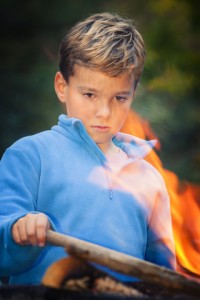Every day six children are hospitalised because of burns. Fire and Safety Centre backs Child Safety Week 2015 by highlighting the dangers all around us, so you can keep children safe from them and prevent unnecessary injuries

Daniel’s big mistake* was to run upstairs when the fire started. He didn’t know that within minutes he would have paid for it with his life. They think he was fleeing to escape a telling off from his mum, because he’d started the fire. He didn’t know that running upstairs was the worst thing he could have done. Why would he? He was only five. He didn’t know either that upstairs he would fall victim to the smoke, rather than the fire that created it. Only a small burn on his hand showed that he’d used the lighter, but his story shows the awful consequences of children playing with fire.
Fire starts because of three things that come together: fuel, oxygen and an ignition source are all that’s necessary. Add an inquisitive unsupervised child to the mix and the trouble really starts.
In Daniel’s case he was alone and amusing himself by playing with his mum’s cigarette lighter. He’d seen her use it, and wanted to try it himself. He should never have been left alone, of course, but that’s another debate for another place. In spite of that he might have been alive today if he hadn’t been able to get his hands on the lighter.
And it’s Daniel’s misadventure that features at the top of the list of our ten top tips for fire safety for kids in Child Safety Week 2015, which runs from June 1st to 7th.
Child Safety Week 2015
Child Safety Week is the flagship annual campaign run by the Child Accident Prevention Trust. It brings together all sorts of agencies and offers innovative ways to promote child safety. This year it’s taking as its theme ‘teatime terrors’ by focusing on what can go wrong at that time of day.
There are opportunities for children to get burned all around us – and they do. Every day six children suffer burns serious enough for them to be admitted to hospital, not just to be treated at home or even in A&E departments.Ideas for raising awareness about burns and scalds are available but we’d like to offer our ten top tips.
Our ten top fire safety tips
1. Remember Daniel: Never leave lighters or matches where inquisitive little fingers can get hold of them
2. Fit smoke detectors: Early warning of a fire when a family is asleep can give you the precious extra seconds to escape
3..and maintain them: A smoke detector is useless if its battery dies or is removed. Get into a routine of check and renew to make sure yours all work all the time
4. Move the straighteners: Hair straighteners get hot enough to cook bacon, and will stay that way for up to 15 minutes after they’ve been turned off. Put them safely out of harm’s reach
5. Cook with care: Use the back burners on the hob so children can’t pull hot pans onto themselves, and never leave the oven door open. Children don’t know when things are hot. Pulling hands smartly out of the way is not instinctive; it’s a learned reflex
6. Beware of scalds: Hot drinks are hot enough to scald a child for as long as 15 minutes after they’ve been made. Move them away from the edge of the table; don’t use low coffee tables, and never pick up a child with one hand and a hot drink with the other
7. Plan an escape: Make a game of creating and learning the quickest route to safety in your home in the event of a fire
8. Teach the right lesson: Be careful how you tell younger children about hoax or arson; they may get the wrong idea and try it for themselves
9. Use a fireguard: Although much less common than they used to be, open fires present no less of a risk today. Children can easily trip and fall into the fire. We know a 60-year-old lady with burn scars on her neck after she fell into a fire as a toddler. Only her father’s swift action prevented much more serious injury
10. Teach hazard recognition: Children don’t instinctively know what’s dangerous; they need to be taught – and it’s never too early to do that. Such life lessons will help them to avoid or neutralise existing hazards, and not to create their own
But don’t be afraid; house fires are rare, and by following our tips and those offered by Child Safety Week you can make them even safer.
*This is a true story. We’ve just changed the little boy’s name.

